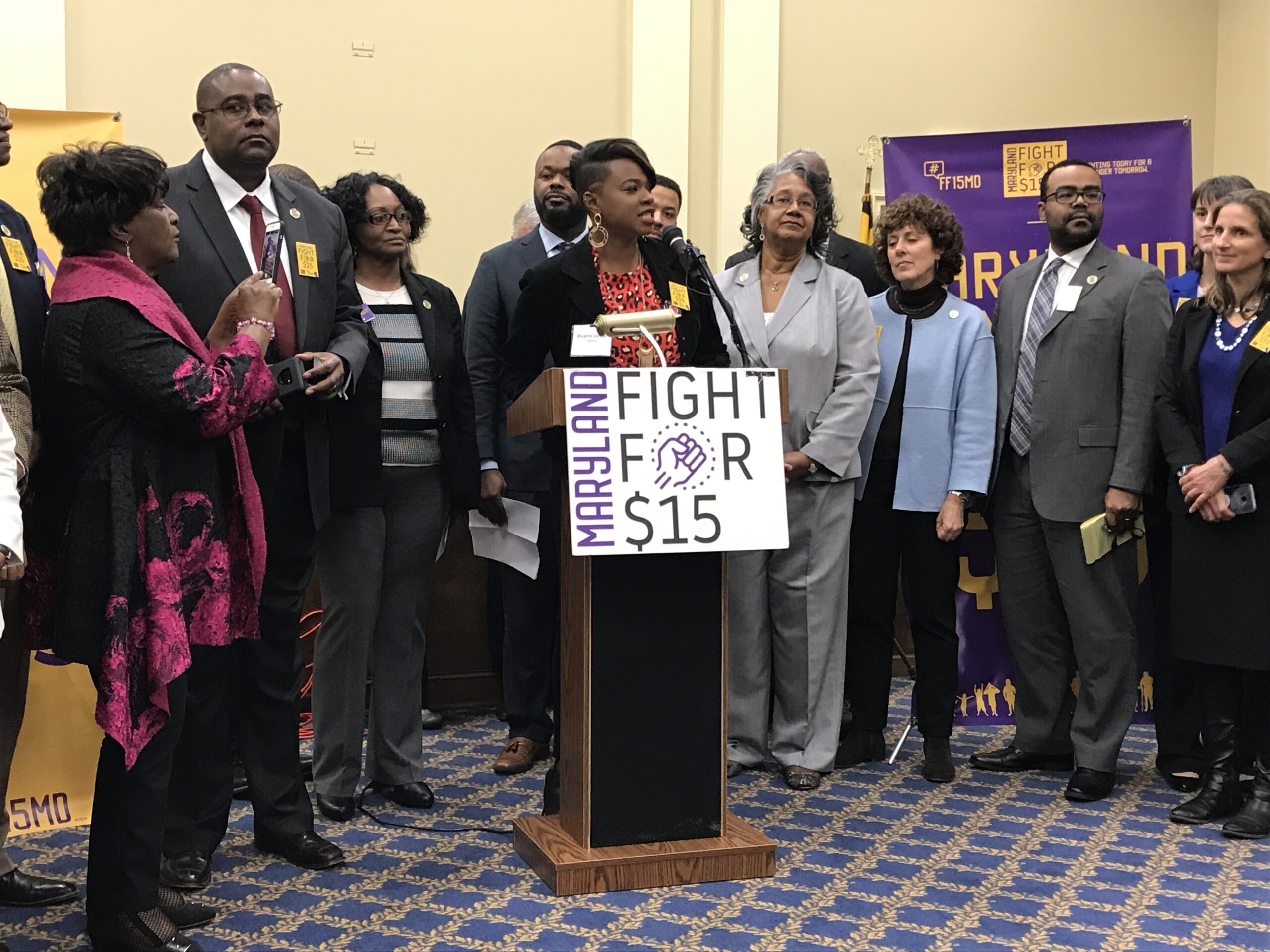Lawmakers, Advocates Promise Push for ‘Clean 15’ Bill

Lawmakers, advocates ― and even some small business owners ― gathered in Annapolis on Monday evening, vowing to push for a $15 minimum wage bill.
Ricarra Jones of Maryland Fight for $15 said more than 70 legislators have already signed a pledge to support a “Clean 15” bill, which would not include exemptions for some workers, carve-outs for certain industries or proposals floating around the State House that would establish different geographical minimum wages within the state.
The bill, which is expected to be introduced this week and sponsored by Sen. Cory V. McCray (D-Baltimore City) and Del. Diana M. Fennell (D-Prince George’s), would increase the state’s minimum wage by roughly $1 a year until it hits the $15 mark in 2023. Beyond that, the state’s minimum wage would be adjusted annually based on the cost of living, a move more than 16 other states and the District of Columbia have already made.
The bill would also remove exemptions in current law for agricultural and younger workers. It would also phase out the state’s sub-minimum wage for tipped workers by 2026, Jones said.
Maryland’s current minimum wage increased to $10.10 per hour on July 1. The state’s minimum hourly pay for tipped workers is $3.63 an hour now; when the legislature last increased the standard minimum wage, it froze the pay for tipped workers at that rate.
Jones said the bill, with its multi-year phase-in of the increased wage already represents compromise, and urged lawmakers to vote against any additional amendments.
“We are positive that working families are struggling today and they need more money today, but we’re willing to compromise and do it in a way that works for business and a phase-in incrementally is what we have found that works,” Jones said.
In addition to champions in the legislature, McCray said the bill has support from countywide leaders, including the county executives of Howard, Baltimore and Montgomery counties and the mayor of the city of Baltimore.
The Legislative Black Caucus, with 56 members, has also agreed to back a “Clean 15” bill, Chairman Del. Darryl Barnes (D-Prince George’s) said. “We are unified, with 100 percent of our membership standing behind the fight for 15,” he said.
Business groups like the National Federation of Independent Businesses opposed the measure last year ― when a $15 minimum wage bill died in committee ― and continue to oppose the measure this year, fearing a one-size-fits-all approach they argue could be damaging to small businesses.
Gov. Lawrence J. Hogan Jr. (R) expressed concern about the bill before the start of this year’s legislative session, saying that it could hurt Maryland’s business climate. Nearby states have lower minimum wage rates and businesses could be lured to relocate, Hogan said.
But some small businesses came out in support of the proposal on Monday night.
Alissa Barron-Menza, vice president of Business for a Fair Minimum Wage, argued that a higher minimum wage could lead to less employee turnover and greater worker ― and, in return, customer ― satisfaction at small businesses.
“A minimum wage of $10.10 leaves many working Maryalnders without sufficient income to meet their basic needs and that’s bad for Maryland businesses. Workers are also customers. Raising the minimum wage boosts sales as workers are able to afford goods and services they could not before. And put simply, our businesses need customers with money to spend.”
She rattled off a list of some Maryland businesses that have joined the network supporting the increase: popular restaurant chains Busboys & Poets and &Pizza, local hardware stores and BA Auto Care in Columbia, whose owner Brian England spoke at the news conference.
Many of the speakers on Monday night framed the minimum wage debate around deeper issues.
Fennell said an increase in the minimum wage would help address historical racial and gender pay gaps.
“We must stop allowing greedy corporations to pay women and people of color poverty wages,” she said.
Kobi Little, a faith leader from Baltimore, paused to reflect on the anniversary of Rev. Martin Luther King Jr.’s birth. Little said the debate should be focused around “the immorality of poverty wages.”
“There is a correlation between jobs and justice. … Without jobs that pay a living wage, there can be no justice,” he said.




 Creative Commons Attribution
Creative Commons Attribution